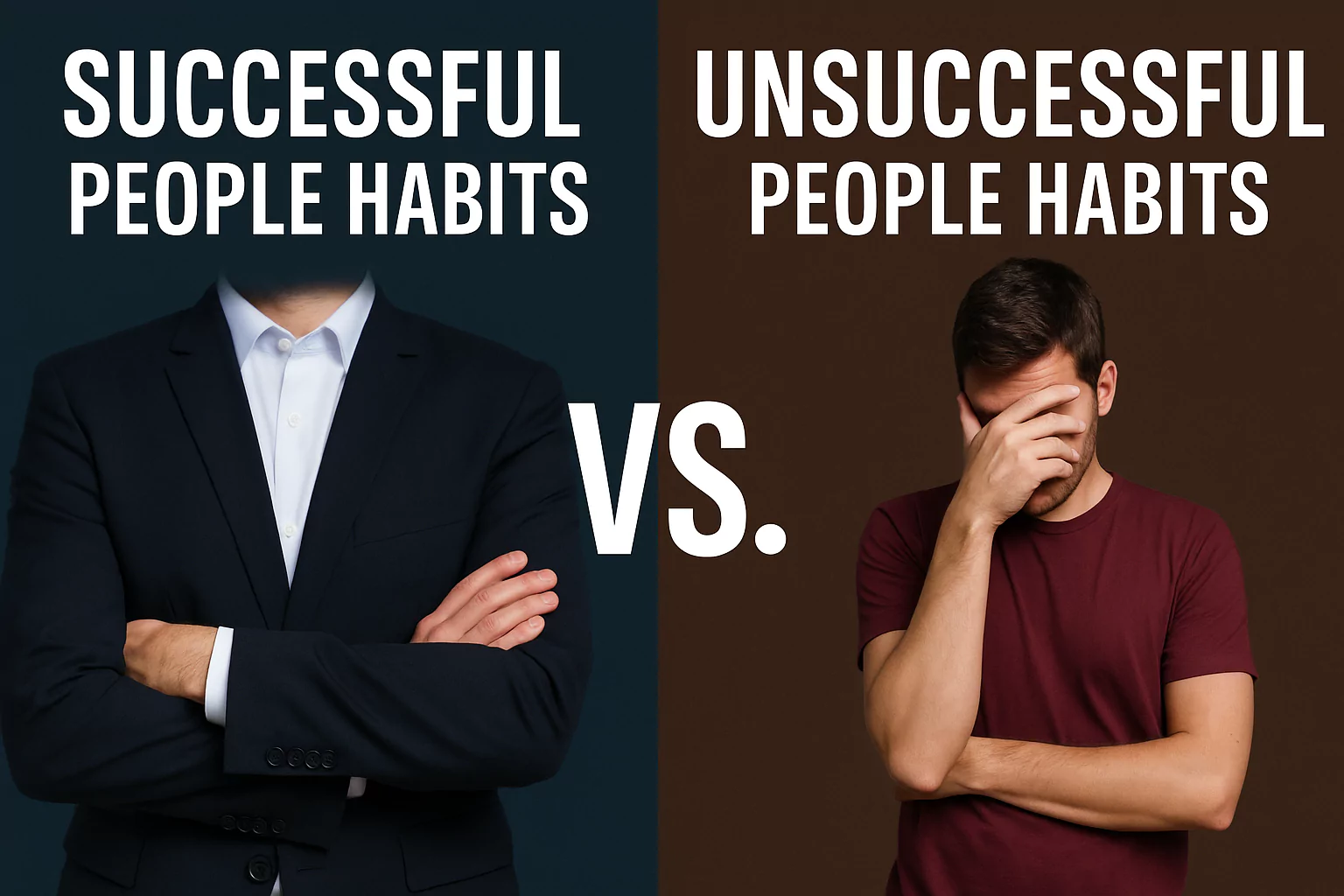Successful People Habits Vs. Unsuccessful People: Top 10 Habit

Successful people consistently follow habits that promote growth, focus, and resilience. These include goal-setting, time management, learning, and a growth mindset. In contrast, unsuccessful people often fall into patterns of procrastination, blame, fear of failure, and poor discipline. By comparing these 10 daily habits, you can understand what truly separates achievement from stagnation.
1. Goal-Oriented vs. Aimless Living
Successful: Set specific, measurable, and time-bound goals. They track progress and realign strategies as needed.
Unsuccessful: Lack clear goals, often going through life reactively instead of proactively.
Why it matters: Goals provide direction. Without them, people drift without purpose, losing time and opportunities.
2. Time Management vs. Time Wasting
Successful: Prioritize high-impact tasks using methods like the Eisenhower Matrix or time-blocking.
Unsuccessful: Spend time on unproductive activities such as excessive scrolling, gossip, or distractions.
Insight: Time is a non-renewable resource. Managing it well creates compounding success over time.
3. Self-Discipline vs. Instant Gratification
Successful: Practice delayed gratification. They stick to routines and resist temptations that don’t serve long-term goals.
Unsuccessful: Easily give in to distractions, comfort, and short-term pleasures at the cost of bigger achievements.
Tip: Discipline builds trust in yourself and moves you forward even when motivation fades.
4. Lifelong Learning vs. Fixed Mindset
Successful: Read books, take courses, and seek mentors. They believe skills can be developed.
Unsuccessful: Believe they “know enough” or that intelligence is static. Avoid learning opportunities.
Evidence: Leaders like Elon Musk or Oprah Winfrey attribute a large part of their success to constant learning.
5. Healthy Habits vs. Neglecting Health
Successful: Exercise regularly, eat clean, and sleep well. They treat their body as an asset.
Unsuccessful: Neglect physical and mental health, often using unhealthy coping mechanisms.
Fact: Physical health directly impacts mental clarity, energy levels, and decision-making.
6. Positive Self-Talk vs. Negative Inner Voice
Successful: Use affirmations, self-compassion, and believe in their potential.
Unsuccessful: Dwell on failures, self-doubt, and speak to themselves harshly.
Mindset shift: Your internal dialogue shapes your identity and confidence over time.
7. Networking and Collaboration vs. Isolation
Successful: Build relationships, seek feedback, and collaborate openly.
Unsuccessful: Avoid feedback, distrust others, or isolate due to ego or fear.
Why it works: Opportunities come through people. Strong networks create leverage and learning.
8. Taking Responsibility vs. Blaming Others
Successful: Own mistakes, learn from them, and take charge of outcomes.
Unsuccessful: Blame circumstances, people, or luck for their failures.
Note: Accountability leads to empowerment; blame leads to stagnation.
9. Risk-Taking vs. Fear of Failure
Successful: Embrace calculated risks and see failures as lessons.
Unsuccessful: Avoid new ventures due to fear of judgment, loss, or discomfort.
Real Talk: Growth often happens just outside your comfort zone.
10. Consistency vs. Inconsistency
Successful: Show up daily, even in small ways. They build momentum over time.
Unsuccessful: Start with enthusiasm but quit early due to lack of visible results.
Reminder: Success is less about talent and more about showing up every single day.
Final Thoughts
The difference between success and failure isn’t usually talent or luck. It’s about habits. Small daily actions compound into big results over time. By shifting just one or two habits, you can begin aligning yourself with what makes people truly successful. Analyze your routines, be honest with yourself, and take intentional steps to grow.








